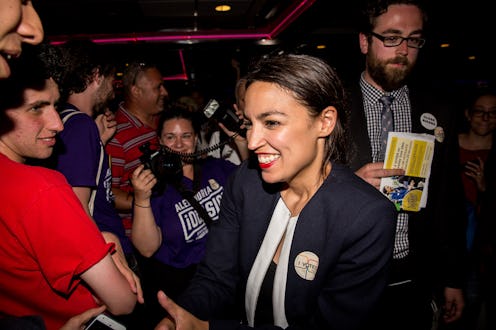News
Alexandria Ocasio-Cortez Could Be The Youngest Congresswoman Ever & This Quote Shows Why

One race in New York's Democratic primaries on Tuesday showed just how dangerous it can be to discount the power of the underdog. A 28-year old political newcomer successfully challenged Rep. Joe Crowley for the Democratic seat in New York's 14th district. And there was one thing Alexandria Ocasio-Cortez said after her victory that stood out.
Ocasio-Cortez is a former political organizer for Sen. Bernie Sanders and ran a grassroots campaign that ultimately led her to victory, despite being outspent by Crowley by a 10-to-1 margin, according to CNN. "This race is about people versus money," she said in her campaign video. Ocasio-Cortez's campaign is characterized by a reclamation of political power for those who historically haven't had a voice in politics.
Throughout the race, she made an effort to reach out to groups that she said "experts" advised her not to bother with, like young voters and people of color. During her victory speech, she said:
You have given this country hope, you have given this country proof that when you knock on your neighbor's door, when you come to them with love, when you let them know that no matter your stance, you are there for them — that we can make change.
Ocasio-Cortez is a third-generation Bronxite who emphasized her ties to the community in order to connect with voters. She drew upon her background as an educator and an activist, but also as a former bartender who was used to working long hours on her feet.
Crowley was repeatedly criticized for his lack of consistent engagement in the community. "The Queens of today is not the Queens of 20 years ago and Joe Crowley has lived in Virginia that entire time, he raises his children out there, his home is out there, he’s not a member of this community,” Ocasio-Cortez said. She believed it was time for New York’s 14th, one of the most ethnically-diverse districts in the country, to have a representative that wasn’t “mismatched” with their community.
The connection she has to her community that she expressed in her victory speech is also evident in her progressive platform. In describing her stances, she often refers to using a bottom-up approach to advocate on behalf of the most vulnerable communities. Most notably, she calls for universal healthcare, abolishing Immigration and Customs Enforcement (ICE), and tuition-free public colleges.
One of her positions is especially personal. Ocasio-Cortez is first-generation Puerto Rican American and strongly believes in standing in solidarity with Puerto Rico through more government funding for hurricane relief. In her platform, she references her “friends and family” who have been directly affected by the government’s inaction in helping with the aftermath of Hurricane Maria.
The love Ocasio-Cortez expressed for her neighbors in her victory speech is in stark contrast to the fear of the other President Donald Trump promoted throughout his own campaign and often still uses on a daily basis. Where Trump sees difference, Ocasio-Cortez says she sees hope.
Spurred by the fight against child separation, Ocasio-Cortez even visited Tornillo, Texas, the site of the first ICE detention center, just two days before her own primary. While many view her call to abolish ICE as radical, she sees it as a necessary step toward reconciling the “corrosive impact” ICE has had on families and communities.
One of the main messages of Ocasio-Cortez’s campaign, that the politically forgotten can make a difference, is not altogether that different than Trump’s. However, the positivity and love she has conveyed could be viewed as the antithesis to Trump’s preferred political strategy.
If she goes on to win in November, it will likely be because of her passion for and belief in her community. It will be interesting to see just how Washington responds to this new force in Congress.